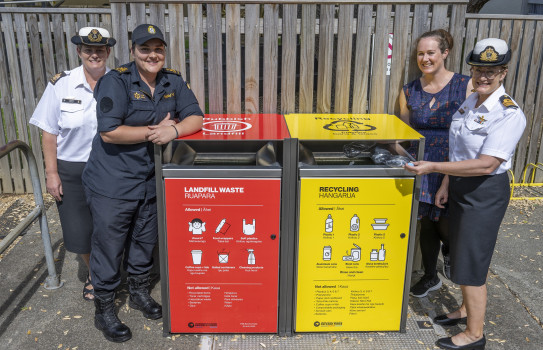Tohu Awards 2024
18 November 2024
Unfortunately you are viewing this website on an outdated browser which does not support the necessary features for us to provide an adequate experience. Please switch to a modern browser such as latest version of Google Chrome, Mozilla Firefox, Apple Safari or Microsoft Edge.
Ngā mihi nui
Devonport Naval Base could nearly halve the amount of waste it produces and reduce waste costs by about a quarter in a “war on waste” with the backing of shore-based staff who were outnumbered by rubbish bins under their desks.
The project is being led by Petty Officer Lexie Gray and New Zealand Defence Force Sustainability Director Lee Bint, who say there was clear need for Devonport to improve how it handled workspace waste.
In 2023, Petty Officer Gray noticed a growing interest in waste-related sustainability ideas being submitted to an innovation suggestion box.
"Many came from senior leaders. There was a clear desire to see change."
Following a survey and analysis, they identified a major challenge: the excessive number of under-desk bins in offices and not enough options to recycle.
"The cleaners did a walk-through and counted 994 bins. That's more bins than we have people working ashore,” Petty Officer Gray said.
“It became clear that we need to find an alternative option.”
After “dumpster diving” to understand what was being thrown out, they began a trial at the base’s North Yard, where 371 under-desk bins were replaced with just 69 new bin stations.

The Method Bins had been used at Defence House in Wellington and Trentham Military Camp, which were driven by Dr Bint’s research that showed personnel wanted consistent bins, bin labels and colours for recycling.
A red bin is for landfill, while blue, yellow and green bins are for glass, plastic and cans and organic waste.
“We expect to see a 47 per cent reduction in waste volume by diverting waste to recycling,” Petty Officer Gray said.
“There should also be a 25 per cent reduction in waste collection costs due emptying our skip bins less frequently, and a significant boost in customer satisfaction, which had been previously rated low.
“We have also reduced the walking footprint for our cleaners to save them time and effort every day from emptying less bins.
“We are already hearing that cleaners are appreciating reduced strain on their back from not having to bend over so far, so frequently too."
Dr Bint said they were excited about the early success of the trial.
"The feedback from staff has been overwhelmingly positive, and we’re seeing a measurable impact on efficiency and waste reduction.
“The initial figures suggest that if rolled out across the New Zealand Defence Force, we could save a significant amount annually in waste disposal costs and reduce our environmental footprint.”
The implementation of the War on Waste has been a collaboration with PAE and supported by Defence Estate and Infrastructure.
There are plans to introduce another bin type to the bin stations in the future to help complete the recycling loop, with long-term plans for organic waste and paper bins.
Petty Officer Gray has also explored a variety of other waste reduction options, including soft plastic recycling, reverse vending machines, plastic shredders to create 3D filament, composting options, sea strainer filters and more.
"This is just the beginning," she said. "We hope to continue refining our waste management processes and implement even more initiatives in the future to make Devonport Naval Base a home we can all be proud to be part of."